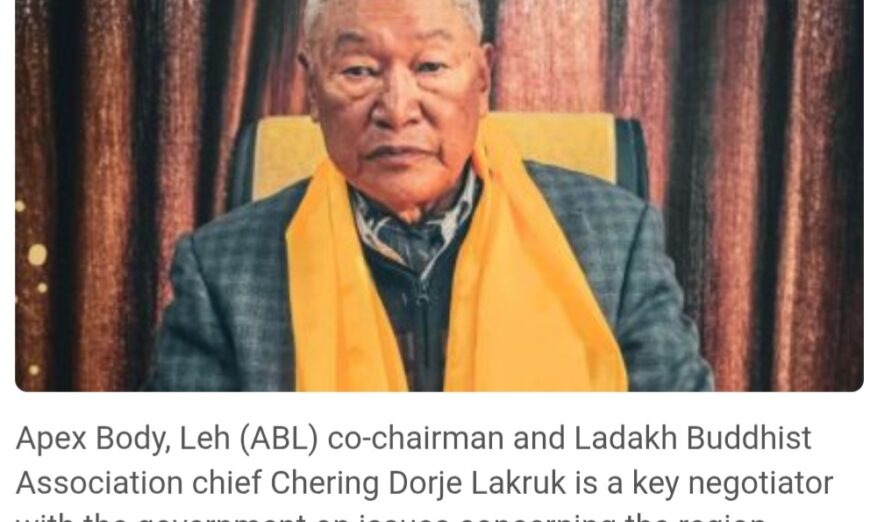SRINAGAR: Ladakh’s prominent Buddhist leader Chering Dorje Lakruk has admitted that while residents of the region once resented Article 370, in hindsight, they now see it as a protective shield that kept their land and livelihoods secure for decades. In an interview with The Indian Express, Lakruk, who is co-chairman of the Apex Body, Leh (ABL) and also heads the Ladakh Buddhist Association, said the abrogation of Article 370 has left Ladakh “open for the entire country” without safeguards. Outsiders are buying land, big hotel chains are moving in, and locals, he warned, are fast losing out.
“We used to curse Article 370 because it was an obstacle in our way to becoming a Union Territory,” Lakruk, a former minister in the erstwhile Jammu and Kashmir told the newspaper. “But it protected us for 70 years. Our land was totally safe. Even people from Jammu and Kashmir did not come here. Now Ladakh has been opened up for the entire India. We have no safeguard.”
The remark comes against the backdrop of continuing protests in the region, some of which turned violent recently. Lakruk described the unrest as “totally spontaneous”, driven by thousands of educated but unemployed youth. “If they were lumpens, they would not have known the difference between a BJP flag and the national flag when the BJP office was attacked,” he said, stressing that the anger had been building for six years since the Union Territory was carved out in 2019.
Lakruk argued that promises made with the UT formation remain unfulfilled. No new posts have been created, the local recruitment system has been dismantled, and six years on, the Union Territory still has no public service commission or local cadre. “Not one gazetted post has been filled up,” he said. Instead, contractual recruitment has flourished, which, he alleged, has only bred corruption, with middlemen pocketing money meant for teachers and other staff.
The Autonomous Hill Development Councils, which once exercised substantial authority, are now “virtually defunct”. Council employees, Lakruk noted, have been diverted to work for the UT administration, while key powers over land and development rest with the Lieutenant Governor and bureaucrats. “On paper, land is under the jurisdiction of the council. But unless the UT administration agrees, no file moves forward,” he said, adding that this erosion of authority had left people feeling powerless.
Lakruk said that people in Ladakh never wanted a Union Territory without a legislature. “We always wanted UT with a legislature. Srinagar was far, but Delhi is farther. Now, the funds that come from the Centre, only 10% reach the Council. If we had a legislature, all funds would have come here. Today, commissioners and secretaries have become our rulers.”
He cited old laws being overturned and land use being restricted, making it harder for locals to build homes or run guesthouses. “How will guest house owners compete with big hotels?” he asked. “This is happening because people do not have their own government. They do not have representatives. We have no legislative powers.”
For the younger generation, unemployment has become a chronic crisis. Before 2019, Lakruk said, state recruitment drives absorbed many. Now, even those who get jobs are stuck in insecure, poorly paid contracts. The UT’s administrative reshuffle has left five new districts only on paper, without Deputy Commissioners, senior police officials, or departmental heads.
On top of this, the administration’s handling of traditional laws has created resentment. For example, village heads, who play a crucial role in maintaining customs and rituals, are being pushed aside on grounds of age. “The Jammu and Kashmir government never did this,” Lakruk said. “It is the elderly who know the customs the best.”
Lakruk also spoke about growing opposition to the mega solar project planned in Ladakh. Unlike the smaller project proposed during his ministerial days, he said the new 15,000 GW initiative will engulf 45 km of fragile pastoral land used by Pashmina goat herders. “Where will the nomadic herders go? That area is ecologically fragile,” he warned.
With 45,000 workers expected from outside, the local population of 15,000 would be overwhelmed. “They say this will generate employment. But the nomads are unlettered. What employment will they get? You are making a fool of us,” Lakruk told the newspaper, aligning his concerns with those raised by activist Sonam Wangchuk.
The Apex Body and other groups have been negotiating with the Centre for six years, seeking constitutional safeguards under the Sixth Schedule of the Constitution to protect Ladakh’s unique culture, land, and environment. But Lakruk said little has moved beyond a domicile-based job reservation, which too is not comprehensive. “Our main issue has not even been discussed yet. Will that take another six years? Our lives will be lost,” he remarked.
Lakruk argued that the BJP’s ideological emphasis on “homogeneity” is a stumbling block. “They are not in favour of empowering people in pockets. The Sixth Schedule protects local customs and age-old laws. When we were part of Jammu and Kashmir, even though we did not have the Sixth Schedule, the administration never interfered in our local affairs. Now, there is interference.”
For now, Lakruk said, the anger on the streets of Leh and Kargil stems from a deep sense of betrayal. People see defence roads being built, but few projects that meet local needs. They see bureaucrats rotating in and out every two years, with little time or incentive to understand Ladakh’s harsh realities.
“This is why people are protesting,” he said. “Earlier, we thought Article 370 was a curse. Now, we realise it was our safeguard.”

